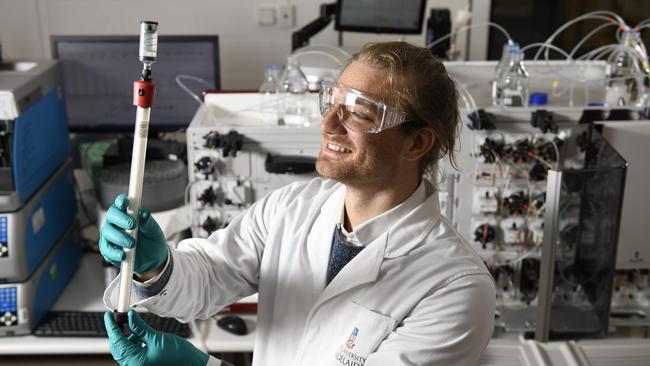Budget 2021: Homegrown mRNA jabs closer to reality
Australia is moving closer to achieving self-reliance in COVID vaccine production, with the federal government confirming it is looking at providing financial support for an mRNA vaccine production plant in Adelaide.

Australia is moving closer to achieving self-reliance in COVID vaccine production, with the federal government confirming it is looking at providing financial support for an mRNA vaccine production plant in Adelaide.
The Australian revealed on Wednesday that Australia could achieve total vaccine self-reliance within six months and produce enough synthetic vaccine to inoculate the entire nation under a partnership between international biotech giant BioCina and the University of Adelaide.
The initiative is a joint venture between BioCina, UA and the SA Health and Medical Research Institute which is framed around the purchase of a purpose-built and regulatory-compliant Pfizer biologics manufacturing plant in Adelaide.
The plant was bought last year and is ready to produce synthetic mRNA vaccines such as Pfizer and Moderna that do not contain live coronavirus but are produced by a process called microbial fermentation which produces plasmid DNA, meaning the vaccines can be produced faster and on a larger scale.
The Australian understands BioCina is seeking assistance in the order of $60m-$100m to kickstart the project, which could begin quickly as the Pfizer plant is fully operational and has been approved by the TBA and the US FDA for vaccine production.
SA Premier Steven Marshall has written to federal Health Minister Greg Hunt hailing the proposal as unique and ready to start. “The letter advises Minister Hunt that the company’s Adelaide site is the only commercial facility in Australia focused on development and manufacturing at scale of microbial-based biological pharmaceuticals that is approved by the TGA, European Medicines Agency, Health Canada and the US Food and Drug Administration,” a spokesman for the Premier told The Australian.
“It also advises the unique facility can be rapidly expanded to establish Australian capabilities that are not currently available and that by leveraging and building on existing capability at the BioCina facility, mRNA vaccines could be produced at scale in Australia in less than 12 months.”
Finance Minister Simon Birmingham told The Australian that the commonwealth was considering supporting the project as part of its plan to achieve self-reliance in vaccine manufacturing. “It is a distinct possibility,” Senator Birmingham said.
“It is certainly our intention to secure mRNA vaccine capability and manufacturing capability for Australia. This is new technology, it’s how vaccines are made that only came about from the surge in research that COVID drove around the world.
“Australia didn’t have the capability, and doesn’t have it at present, to manufacture that vaccine, but we have been talking to the big companies like Pfizer and Moderna about getting the technology transfer of their vaccine patents to an Australian manufacturer to enable that.”
Senator Birmingham said there were measures in the budget to fund technology transfer between companies such as Pfizer and Moderna and potential Australian manufacturers, and then to encourage potential local manufacturers to produce the vaccine.
He said the Health Department had been in talks with BioCina and the SA government had made representations outlining the preparedness of BioCina, UA and SAHMRI to embark on the project. “I understand our Health Department officials have had discussions in the past with BioCina and we look forward to them being part of the process,” Senator Birmingham said.
“It’s one part of the options available as we seek to deliver that vaccine manufacturing capability in Australia, knowing that the COVID vaccine probably won’t just be the ones people will be getting over the next 12 months but will necessitate likely booster shots that we would like to have made in Australia. This technology will probably be used for other vaccines in the future that we want manufactured here too.”




To join the conversation, please log in. Don't have an account? Register
Join the conversation, you are commenting as Logout